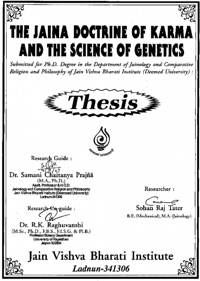The Hardy-Weinberg law assumes that human population is static. But in reality, human population and consequently human gene pool is never static. There are several factors which influence the human gene pool is never static. There are several factors which influence the human gene pool. The following are some factors:
(i) Mutation
Mutation implies a change in the genetic material of an organism which results in a new inherited variation. Mutation is a rather regular phenomenon in nature. It is now recognized that mutant genes are so wide spread in their occurrence that every one of us might be harbouring a few or many of them. According to modern Genetics, the entire body structure of man and every other animal and plant cell have been built through hundreds of millions of years by means of a long succession of mutation.[42] The cause of spontaneous mutation is not yet known. The Jain doctrine of karma says cause of mutation is karma of individual organism. Accumulated karma of living organism direct mutation of genes. All the activities of genes are determined by karma of individual organism. But we know that certain external influences such as ionizing radiation and certain chemicals are capable of producing mutations experimentally and there is no reason to believe that man is exception. Most mutant genes are believe to be harmful. But there are instances where a mutant gene could be beneficial e.g. sickle cell anaemia. The heterogygotes of sickle cells trait were found to be resistant to falsiparum maleria. Some mutant genes remain "neutral" in that they do not harm or impair the survival ability of the carriers.
(ii) Natural Selection
Darwin proposed the theory of natural selection or survival of the fittest to explain evolution. Natural selection is the process where by harmful genes are eliminated from the gene pool and genes favourable to an individual tend to be preserved and passed on to the offspring. When DDT was first used, it was lethal to houseflies. Today, not many houseflies are killed by DDT. This is an example of natural selection in response of DDT, the resistant variety of houseflies have become the usual form. The forces which operate in the animal kingdom do not apply in human populations because man by his superior intelligence has interfered with natural selection in every conceivable way by changing the environmental conditions under which people live and by advances in technology, public health and medical care services.
(iii) Population Movement
Because of industrialization, increased facility for earning, ways of living and education, people are moving—sometimes on a large scale. From rural to urban areas. Such population movements will lead to changes in the distribution of genes, affecting both the areas of immigration and emigration. The intermixing of people makes new genetic combinations possible.
(iv) Breeding structure
(v) Public Health MeasuresIf all marriages were to occur in a random fashion, the effect would be the attainment of a genetic equilibrium. In practice, however, mating tend to occur selectively within various sub groups based on religion, economic and educational status and family relationships. In open societies, there is more freedom in mating. For instance doctors tend to marry doctors or nurses, musicians tend to marry musicians. This type of mating is called "assortative mating", or birds of the same feather flocking together. The genetic consequences of assortative mating have not been adequately studied.
Advances in public health and medical care services do effect the genetic endowment of people as a whole. More lives are now being saved by advances in medical sciences than ever before. For instance, Ramstedt's operation which was introduced in 1912 has saved many children suffering from congenital pyloric stenosis. Individuals with genetically conditioned retinoblastma may be saved by timely surgery. The provision of insulin has saved the lives of diabetics. The carriers of heriditary diseases, malformations and constitutional weaknesses are able to survive and pass their genes to their progeny. Public health measures are thus decreasing the selection rates and increasing the genetic burden. This has led some scientists to prophesy that "Medicine will harm in the long run by helping them in the short run".[43]
 Prof. Dr. Sohan Raj Tater
Prof. Dr. Sohan Raj Tater
 Doctoral Thesis, JVBU
Doctoral Thesis, JVBU